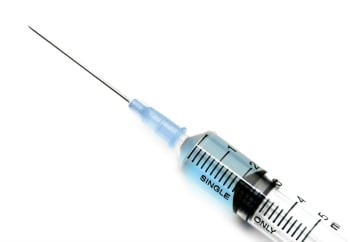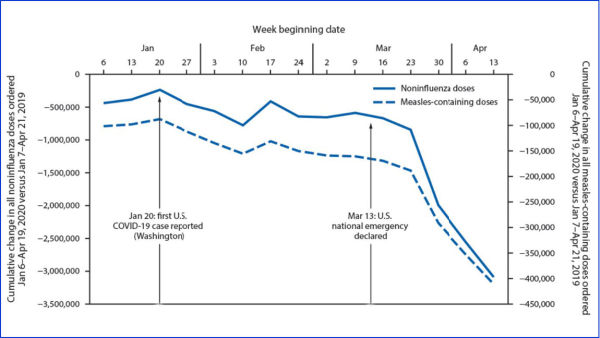 As many as one out of two children were not getting their scheduled vaccines against preventable diseases after New Jersey went into a lockdown this past spring, studies indicate.
As many as one out of two children were not getting their scheduled vaccines against preventable diseases after New Jersey went into a lockdown this past spring, studies indicate.
State data suggests the trend may have reversed come the start of summer, but pediatricians and public health officials want to ensure ground isn’t lost. They are reminding parents to get their kids properly immunized before they return to school next month and underscoring that vaccines matter, regardless of whether classes are held in-person or online.
“Children should be vaccinated, period. We have the ability to protect them and we should,” said Dr. Jeanne Craft, a pediatrician with RWJBarnabas Health and current president of the New Jersey chapter of the American Academy of Pediatrics (AAP). “This is really not the time to back off vaccines. As if any time is a good time,” she added.
Craft said that while some children may begin the academic year remotely — an increasingly popular option among New Jersey school districts, now that Gov. Phil Murphy has given them the choice — eventually they will return to classroom activity in some form. Kids may also be participating in sports or after-school events and have social interactions outside of school that could put them in danger of spreading highly contagious conditions like chicken pox or flu.
“It’s really important to make sure that when that day comes, that they’re as protected as they can be,” Craft said, noting that immunizations also function to protect others from being infected by children and getting sick.
A reminder for parents
To help address vaccine compliance, AAP has launched a public education campaign — #CallYourPediatrician — to remind parents about the importance of regular check-ups, during which many kids get vaccinated. “We’re trying to get the message out,” Craft said. “The setup at the office may be a little bit different, the hours may be a little bit different … but many pediatric practices are seeing kids.”
Fear of contracting COVID-19 — which has now been diagnosed in more than 188,000 New Jerseyans, with at least 14,000 confirmed to have died as a result — led people of all ages to avoid visiting the doctor this spring, raising concerns that their underlying conditions would grow more severe. The New Jersey Department of Health launched a public relations campaign in early May urging patients to not ignore symptoms of medical emergencies like heart attack and stroke.
By the end of May, the DOH was ringing alarm bells about immunization rates in particular, which Health Commissioner Judy Persichilli said had dropped by 40% for children under 2 years and 60% for older kids between March 1 and April 20, when compared to last year. The state urged pediatricians to develop new strategies to ensure they can continue to see young patients safely and encouraged parents not to fear this visit.
“The need to protect against serious childhood diseases like whooping cough doesn’t disappear during the COVID-19 public-health emergency,” Persichilli said at the time.
DOH spokeswoman Janelle Fleming said reports from health care providers suggest that vaccine rates did recover and the numbers for June were equal to immunization levels seen that month last year. Data for July is still being compiled, she said. Information from May was not made public.
The DOH is working with various partners on a statewide flu vaccination communications campaign to “highlight vaccination benefits, correct misinformation, and inform the public about places to access vaccines,” Fleming said.
Extra doses of flu vaccine on the way to NJ
For the upcoming flu season, Fleming said the state will receive extra doses of flu vaccine through two federal programs designed to help low-income families, which will be made available to qualifying individuals through local health departments, federally funded health centers and certain nonprofit organizations.
In addition to declines in visits caused by patient concerns, Craft of the AAP said pediatricians were forced to cut back their hours during the height of the pandemic, given the lack of masks, gowns and other resources needed to safely see families. Other offices closed entirely, she said, while “some went to parking-lot medicine,” examining families outdoors to reduce the chance of coronavirus contamination.
The immunization decline documented in New Jersey appears to correlate with a drop in pediatric visits in general nationwide, Craft said. Older children were more likely to have missed visits, she explained, since the academy urged its members to focus on treating younger children, who are more vulnerable to disease and developmental issues. “There’s so much happening during that first year of life,” Craft said.
In early July, Scientific American reported that vaccination rates for preventable diseases had “plummeted” during the pandemic, based on data it collected from nearly three-dozen states. Monthly inoculations declined as much as 60% in a few states — including Pennsylvania and Maryland — when compared to 2019 figures and dropped between 40% and 50% in New Jersey between February and April.
Nationwide data compiled by the federal Centers for Disease Control and Prevention through a vaccine program for under-insured children suggests the falloff could be even greater, especially for older kids. After the national lockdown began in March, vaccine orders tanked — declining by as much as 300,000 doses over one month; and inoculations fell 70% among patients 2 years or younger and 90% among older children between late February and the end of March.
What New Jersey law requires
Under New Jersey law, to be allowed to attend grade school, children must be vaccinated against at least a dozen infectious diseases, including measles, polio and whooping cough. The process begins as a newborn, continues with several booster shots and new inoculations over the first six months, then every six months until the child is 2 years old. The state requires additional rounds in elementary and middle schools.
According to the state’s immunization database, 89.9% of pupils had received all the required vaccines in advance of the 2019/2020 school year. “For the most part, children are pretty well vaccinated” here, pediatrician Craft said, although localized outbreaks of disease sometimes indicate clusters of non-vaccination. For example, the state identified 19 cases of measles last year, a dozen of which were linked to a cluster in Lakewood.
The childhood vaccination rate in New Jersey has declined slightly in recent years — down from a 92.7% compliance rate high in 2017/2018 — and attempts by the Legislature to reverse this trend by curbing the growing use of religious exemptions to the immunization requirements triggered historic protests at the end of 2019, forcing lawmakers to suspend their plan.


